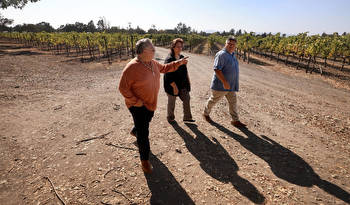Clock ticking on Robinson Rancheria’s slot machines

Five Indigenous California tribes, including two based in Mendocino and Lake counties, are locked in a legal dispute with Gov. Gavin Newsom’s office over renewing their gambling compacts with the state.
The outcome of the case, experts say, has potential implications for every California tribe that holds casino rights.
And while the points of contention are technical, the possibility of immediate fallout is stark for some tribes. They could see the slot machines at their casinos unplugged as soon as April 1 if they are unable to reach some sort of accommodation.
One of those tribes is Robinson Rancheria in Nice, about 75 miles north of Santa Rosa. The casino is owned by a band of Pomo who don’t have to guess what a government-imposed shutdown would mean for their budget.
“We closed ourselves for 125 days during the pandemic,” said Beniakem Cromwell, the Robinson Rancheria chairman. “We know how devastating it is.”
Another timeout would affect many of the tribe’s social programs, he said. And as the chairman pointed out, Robinson Rancheria is one of the poorest communities in one of the poorest counties in California.
“This has nothing to do with revenue,” said Cromwell, 45. “It’s education for members in higher education or vocational school. It’s elders’ monthly social welfare. We use that revenue for after-school programs, sports teams. We fund employees at our elder center, our education center, our tutors.”
The lawsuit at the heart of the conflict has to do with compacts that 61 tribal nations reached with Gov. Gray Davis in 1999. Those contracts were to renew in December 2020, but an automatic 18-month extension kicked in. The deadline is now June 30.
Other tribes, like Federated Indians of Graton Rancheria, which signed its compact in 2012, are not immediately affected.
Most of the tribes with 1999 compacts have already entered new agreements, or signaled a willingness to do so.
But five — Robinson Rancheria, the Hopland Band of Pomo Indians in Mendocino County, the Chicken Ranch Rancheria of Me-Wuk Indians (based in Tuolumne County), Blue Lake Rancheria (Humboldt County) and the Chemehuevi Indian Tribe (San Bernardino County) — have objected to a number of provisions the state sought to add to the compacts.
Those five tribes sued in a case commonly referenced as Chicken Ranch Rancheria v. Gavin Newsom, insisting the new provisions violate the federal Indian Gaming Regulatory Act (IGRA). The suit also argues that the state did not bargain in good faith.
The new provisions include enforcing spousal and child support orders, as well as state laws pertaining to the environment, minimum wage, anti-discrimination and other elements of tort law and the labor code. The tribal plaintiffs also want to modify the trust fund, established in 1999, that redistributes a portion of revenue from tribes that own casinos to those that don’t.
Those protections “are exactly what the state should be asking for,” said I. Nelson Rose, who has spent decades studying tribal gaming law as a lawyer, law professor and government consultant. “To not discriminate on the basis of race, to establish a minimum wage — winning on those points is nothing a tribe should be bragging about. To an outsider, it’s unseemly even to be making these arguments.”
That’s beyond the point, said Les Marston, a Ukiah-based attorney who is representing four of the five tribes, including Hopland and Robinson Rancheria. The issue is not the merits of the provisions, Marston said, but who determines the rules governing these sovereign nations.
“Supporting children. Making sure spouses are adequately compensated. You really think tribes aren’t going to do that on their own?” Marston said. “How paternalistic is that? The issue here is the tribes’ right to govern themselves under their own laws, which is guaranteed them by the Constitution of the United States.”
The Governor’s Office declined to comment on the matter “as it relates to ongoing litigation,” a spokesperson said.
But in Chicken Ranch v. Newsom, state attorneys argued that all of the proposed provisions are “proper IGRA negotiation topics.”
“Moreover,” they wrote to Judge Anthony Ishii, “even if any of the topics exceeded IGRA’s scope, the State could lawfully negotiate and offer the Plaintiff Tribes meaningful concessions to include them in new compacts.”
The case made it to the U.S. District Court for the Eastern District of California a year ago. There, as Marston describes it, Ishii delivered a resounding victory for the five tribes.
“The Tribal Plaintiffs have met their burden of producing evidence the State Defendants did not negotiate in good faith by raising topics in negotiations that were beyond the scope permitted by IGRA or which required some form of meaningful concession in return,” Ishii wrote in his opinion.




































